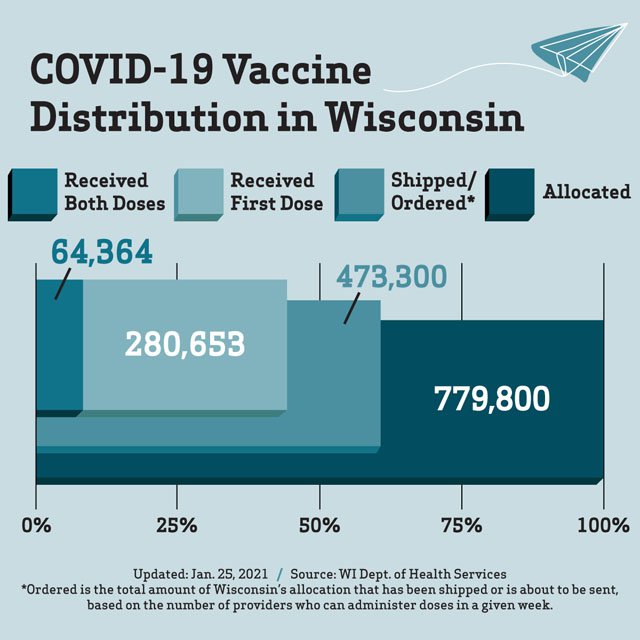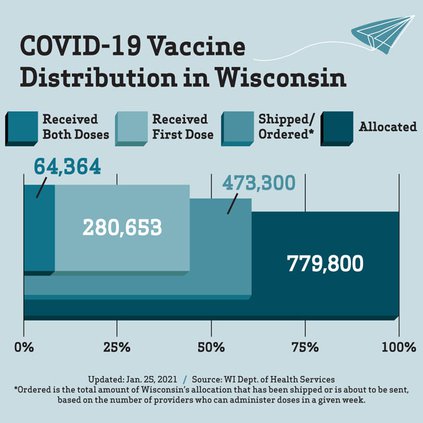DRIFTLESS - Over the past week COVID-19, diagnoses statewide increased from 522,877 on Monday, Jan. 18 to 533,917 on Monday, Jan. 25. That is a statewide increase of 11,040 cases. The number of deaths increased from 5,470 to 5,699, an additional 229 deaths, according to the Wisconsin Department of Health Services.
According to the Monday, Jan. 25 issues of Up North News, the rolling seven-day average of daily new coronavirus cases (1,597) has declined for 13 consecutive days and is now below 1,600 for the first time since Sept. 18.
The dashboard maintained by the Wisconsin Hospital Association shows the number of COVID-19 in-patients has declined for six consecutive days. The total number of hospitalized patients on Sunday was 761, a level last seen Oct. 4
On Tuesday, Jan. 19, Gov. Tony Evers signed Executive Order #104 and Emergency Order #1 establishing a new statewide public health emergency and face coverings requirement, respectively, as the state continues to expand vaccination distribution across the state.
“We’re working every day to get vaccines distributed and get shots in arms to get our state back to some sort of normal,” said Gov. Evers. “At the end of the day, vaccine supplies are limited, so while we continue to ask the federal government for more vaccines and faster, we have to keep working together to stop the spread today by continuing wear our masks, staying home whenever we can, avoiding gatherings, and doubling down on our efforts to keep our friends, neighbors, and families safe.”
Brazil variant
On Monday, Jan. 25, the Minnesota Health Department reported that a Minnesota resident had tested positive for the P.1 coronavirus variant first identified in Brazil.
According to an article in the NY Mag, last week, researchers announced that a troubling new strain of the coronavirus had been detected in the Amazon city of Manaus, Brazil, amid a horrifying surge of new COVID-19 cases in the area. The onslaught of infections has led to the collapse of the local health-care system for the second time during the pandemic. The city was hit brutally hard by the first wave in March, and some experts believed it had reached a level of herd immunity by the fall. Scientists are now trying to determine what role the newly discovered P.1 coronavirus variant — which has at least two key mutations that may make the strain more transmissible and better able to reinfect COVID survivors as well as render vaccines less effective — may have played in the new wave.
The P.1 variant (also known as B.1.1.248) concerns scientists for a few reasons, starting with how it has two notable mutations that may make it more dangerous.
First, it has a spike protein mutation that may make the variant more infectious. This mutation, known as N501Y (or “Nelly”), is also present in the B.1.1.7 variant, which is fast overtaking the U.K., as well as the B.1.351 (also known as 501.V2, or N501Y.V2) variant that has emerged in South Africa. The mutation enables the virus’s spike proteins to more easily bind with human cells, which may make it more infectious. Research has suggested that the B.1.1.7 variant may be more than 50 percent more transmissible than previously dominant strains — which is why scientists and public-health officials are so worried about it.
The P.1 variant also has an “escape mutation” known as E484K, which also exists in the B.1.351 variant from South Africa and which in lab experiments has been found to help the coronavirus evade protective antibodies generated by earlier infections, as well as less susceptible to antibody drugs. In other words, it’s possible that someone who has already been infected with an earlier strain of the coronavirus could be reinfected by a variant with this mutation and that the mutation may enable the coronavirus to evade antibodies generated by COVID vaccines.
To be clear, this does not mean that the currently available coronavirus vaccines will not work against variants with the E484K mutation. Even if the mutation makes the current vaccines less effective to some degree — and it is still not clear how much it will in real-world situations — experts on the matter are by and large optimistic that the vaccines will still offer protection against strains with the E484K mutation. More research is needed, but for now it seems like the worst-case scenario would be that the vaccines would still prevent serious illness from the variants but might be less effective at preventing a mild or asymptomatic infection from them.
The vaccines also can and will be updated to account for this and other mutations over time.
Crawford Countysaw 12 new cases and antigen-probable cases, increasing to 1,654. The number of deaths increased by two to 15.
At the Prairie du Chien Correctional Institution, there have been no changes in case numbers in the past week.
Crawford County Public Health Department is planning to hold community COVID-19 vaccination clinics for anyone in priority populations including those that are age 65 or older. To register for a community vaccination clinic please go to: https://www.crawfordcountywi.org/.../vaccination_sites.pdf
The Crawford County Public Health Department will be holding COVID-19 testing events twice a week on Mondays, 11 a.m. – 12 noon and Fridays, 9-10 a.m. at the Crawford County Administration Building parking lot, 225 N. Beaumont Rd. Prairie du Chien, WI 53821. All tests must be scheduled in advance. Call the Crawford County Public Health Department at 608-326-0229 to schedule an appointment. There is no cost to participate.
Drive through testing will also be offered in February and March in both Prairie du Chien and Gays Mills. In Prairie du Chien, testing will take place at St. Peter’s Lutheran Church, 201 S. Michigan Street, on Feb. 2, and March 2, from 12-4 p.m. In Gays Mills, testing will take place at Vosseteig Funeral Home, 325 Sunset Ridge Avenue, on Feb 16, from 12-4 p.m.
Vernon Countysaw an increase of 37 cases in the last week, increasing to 1,707. The number deaths remained at 37.
Vernon County Health Department staff is currently working on identifying those that would like to receive the COVID-19 vaccine. We will be working with health care workers and long term care staff/residents during the phase 1A administration. Once the state gives us approval to move to phase 1B, which may include essential workers, we will start contacting those interested in receiving vaccine. Please let us know by completing this form if you believe you would be a person qualified for phase 1B. More information to come on where and when you will be able to receive the vaccine. This is just the first step in identifying those that qualify. To register, go to: https://hipaa.jotform.com/210076025290142
Free COVID-19 community testing will be available every other Tuesday, from 10 a.m. to 6 p.m., at the Old Highway Shop in Viroqua, at the intersection of Highways 56 and 14 (across from the Viroqua Food Co-op). Testing events will take place on Feb. 9, Feb. 23, and Mar. 9.
Richland Countysaw an increase of 22 cases, increasing to 1,209. The number of deaths in the county remained at 13.
Upcoming COVID-19 testing events in the county will be held as follows: Richland County Fairgrounds, 23630 County AA, Richland Center, Mondays 9 a.m.–1 p.m. and Thursdays 9 a.m.–4 p.m.
Monroe Countysaw an increase of 155 cases in the last week, going from 3,814 to 3,969. The number of deaths in the county increased by three to 30.
Juneau Countysaw an increase in cases of 46, growing to 2,733. Of the 2,733 cases, 547 of them are at the New Lisbon Correctional Facility, with an increase of three cases there. In addition, at the Sand Ridge Treatment Center in Mauston, the number of cases remained at 50. The number of deaths in the county increased by two, to 16.
LaCrosse Countyhas seen fewer cases than in previous weeks in the number of new cases in the last week of 304, going from 11,078 to 11,382. The number of deaths increased by three to 70.
The Coulee COVID-19 Collaborative is pleased to report several improvements in metrics last week. This look back period saw 286 new cases, down from 419 the previous period. The new daily case rate has decreased to 34.6 cases per 100,000. This is a welcome reduction but is still above the high threshold of 25 cases per 100,000. Percent positive rate also decreased to 25.1 percent, or about one in four tested resulting as positive. Additionally, they saw a decrease in new hospitalizations.
Grant Countyhas seen an increase of 72 cases in the last week, going from 4,371 to 4,443. The number of deaths in the county remained at 78.
Lafayette Countyhas seen an increase of 23 cases in the last week, increasing to 1,355. The number of deaths in the county remained at six.
Iowa Countyhas seen an increase of 14 cases in the last week, increasing to 1,767. The number of deaths in the county increased by one to nine.




